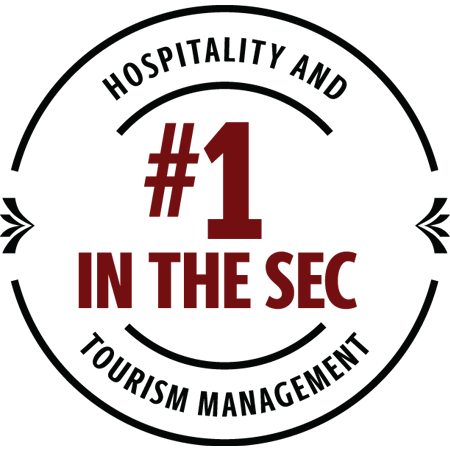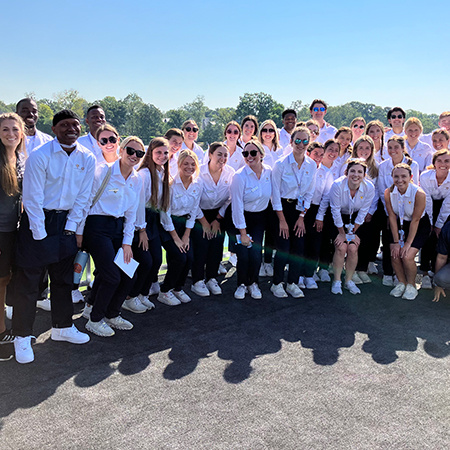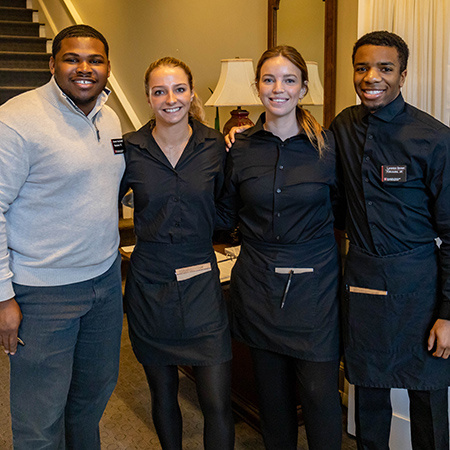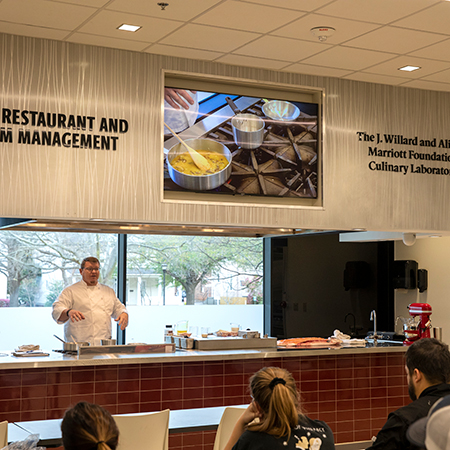
Laura Nix Bishop
Recruitment Coordinator
College of Hospitality, Retail and Sport Management
Hospitality is one of the largest and fastest growing job markets in the country, and the School of Hospitality and Tourism Management prepares students for global careers that blend business management, innovation and a passion for delivering exceptional customer experiences.
One of the top 12 programs in the United States, the University of South Carolina's Bachelor of Science in hospitality management combines business management, hospitality operations and real-world experience to prepare students for success in a wide range of career opportunities. Specialized knowledge in hotel, restaurant, club and theme park management are supported by a strong business foundation with classes such as accounting, economics, business law, communications and computer applications. The degree also includes dynamic electives so students can customize their education experience to match their personal and professional goals.
The Bachelor of Science in Hospitality Management degree requires a minimum of 120 credit hours and is accredited by the Accreditation Commission for Programs in Hospitality Management. The curriculum includes a strong business focus, diverse electives, professional development training and career-related work experience.
Students can choose a specialization in club management, which is endorsed by the Club Management Association of America.
English
Foreign language
Foundations of tourism
Natural science
History
Hotel management
Introduction to hospitality
Mathematics / statistics
University 101
Accounting
Business communications
Business law
Club management
Conference and meeting planning
Economics
Food and beverage production
International hotel management
Purchasing and controls
Festival planning and management
Hospitality / tourism electives
Hospitality / tourism internship
Literature / fine arts
Personnel organization and supervision
Principles of management
Principles of marketing
Professional development seminar
Resort development and management
Sustainable tourism planning
Hospitality finance
Hospitality / tourism analytics
Hospitality / tourism marketing
Hospitality management strategies
Revenue management
Tourism information technology
Wine and spirits in food service establishments
For more details about the degree requirements and curriculum for the B.S. in hospitality management, please visit the academic bulletin.

The University of South Carolina ranks among the top 12 schools in the U.S. and is atop the SEC for hospitality and tourism management according to the ShanghaiRanking's 2023 Global Ranking of Academic Subjects.

Our students work some of the most distinguished tournaments in golf each year, like the Masters Tournament, the Wells Fargo Championship, the RBC Heritage, the Palmetto Championship, the PGA Championship, and the Presidents Cup.

Hospitality management alumna Brittany Martin came to the University of South Carolina looking for the perfect career. Today, she manages conventions and events for some of the country's biggest companies.
Every hospitality management major graduates with career-related work experiences, or internships, on their resume. This experience can be any job in the industry and can include responsibility in a managerial or supervisory position where students gain leadership experience. The college provides dedicated internship directors, experienced faculty and corporate engagement resources to help students get the most out of opportunities to work with companies like Marriott, Hyatt, Hilton, Disney, and the PGA. To learn more, visit our internships page.
Check out the photo gallery below to see where some of our alumni are finding their career success following graduation.
Experiential learning enriches education and creates valuable opportunities to discover new passions and build relationships. Students gain hands-on experience working PGA Tournaments, planning and implementing real weddings and going behind the scenes at some of the world’s best hotels, restaurants and amusement parks.

McCutchen House, the school’s student-run restaurant, serves the campus community and functions as a hospitality management laboratory where students learn to manage a full-service restaurant.

The J. Willard and Alice S. Marriott Foundation Culinary Laboratory, located in the Close-Hipp building, is a 2,000-square foot state-of-the-art commercial kitchen and technology-enhanced classroom providing students with dynamic hands-on experience to prepare for careers in event planning, restaurant management, hotel operations and more.

Recruitment Coordinator
College of Hospitality, Retail and Sport Management